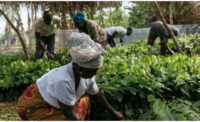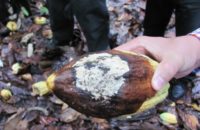Olam launches ‘net-positive,’ cross-commodity sustainability policy
Company to implement policy in two phases.

Olam International has launched the Olam Living Landscapes Policy (OLLP), an approach to agricultural supply chains and landscape management designed to give more than it takes.
The OLLP promotes the co-existence of prosperous farmers and thriving communities with healthy ecosystems. The policy applies across products and covers Olam’s plantations and farms, as well as its third-party sourcing network of more than 4 million small and large-scale farmers. Through it Olam aims to re-imagine agriculture by putting back more into food and farming systems than is taken out.
Noting that agriculture is a “tipping point,” Sunny Verghese, Olam co-founder and group ceo, said it’s no longer enough to do less harm. The goal is to make a “net-positive” impact toward the creation and restoration of natural and social capital.
“We recognize that the publication of this policy is only the start of a challenging process where we will need to assess our own operations, influence a vast network of farmers beyond the reach of our direct sourcing and still operate a viable business”” Verghese said. “I believe that this policy is a strong example of our new company purpose: to re-imagine global agriculture while growing responsibly.’”
OLLP tenets include:
Re-generating the living world
Olam recognizes that much environmental destruction, especially in developing countries, is driven by entrenched poverty. The economic viability of farming and the rural economy is central to achieving positive conservation outcomes. The OLLP says land use activities should be planned and managed to supply food and fiber while maintaining or enhancing critical habitats and re-generating the natural capital of soil, water and natural ecosystems. Unacceptable land use practices for both Olam’s operations and third-party suppliers must be identified and eliminated if present. The OLLP also outlines how local voices play a role in decision-making processes within dynamic, adaptive and resilient landscapes.
A framework for action
Systemic change is difficult and cannot happen overnight, especially in complex supply chains operating in challenging geographies. The OLLP sets out commitments for preparing the “net-positive” framework and how it will be applied through suitable strategies, targets and timelines for Olam-controlled operations and to third-party suppliers. The framework and strategies will be prepared in two phases by 2018 and by 2020.
To prepare the framework, Olam will also seek guidance and advice from a multi-stakeholder network, in particular on-the-ground work, for measuring, valuing and reporting natural and social capital for agriculture. Progress will be reported from April 2019.
“Our generation will need to solve some of the biggest, most intractable challenges in agricultural sustainability, and the solutions require new partnerships and new ways of thinking,” said Christopher Stewart, head of corporate responsibility and sustainability for Olam. “We need to think beyond the farm to the whole food system, describe how to measure success and redefine the responsibility of supply chain actors like Olam towards the communities and whole landscapes from which products are sourced.”
Looking for a reprint of this article?
From high-res PDFs to custom plaques, order your copy today!






